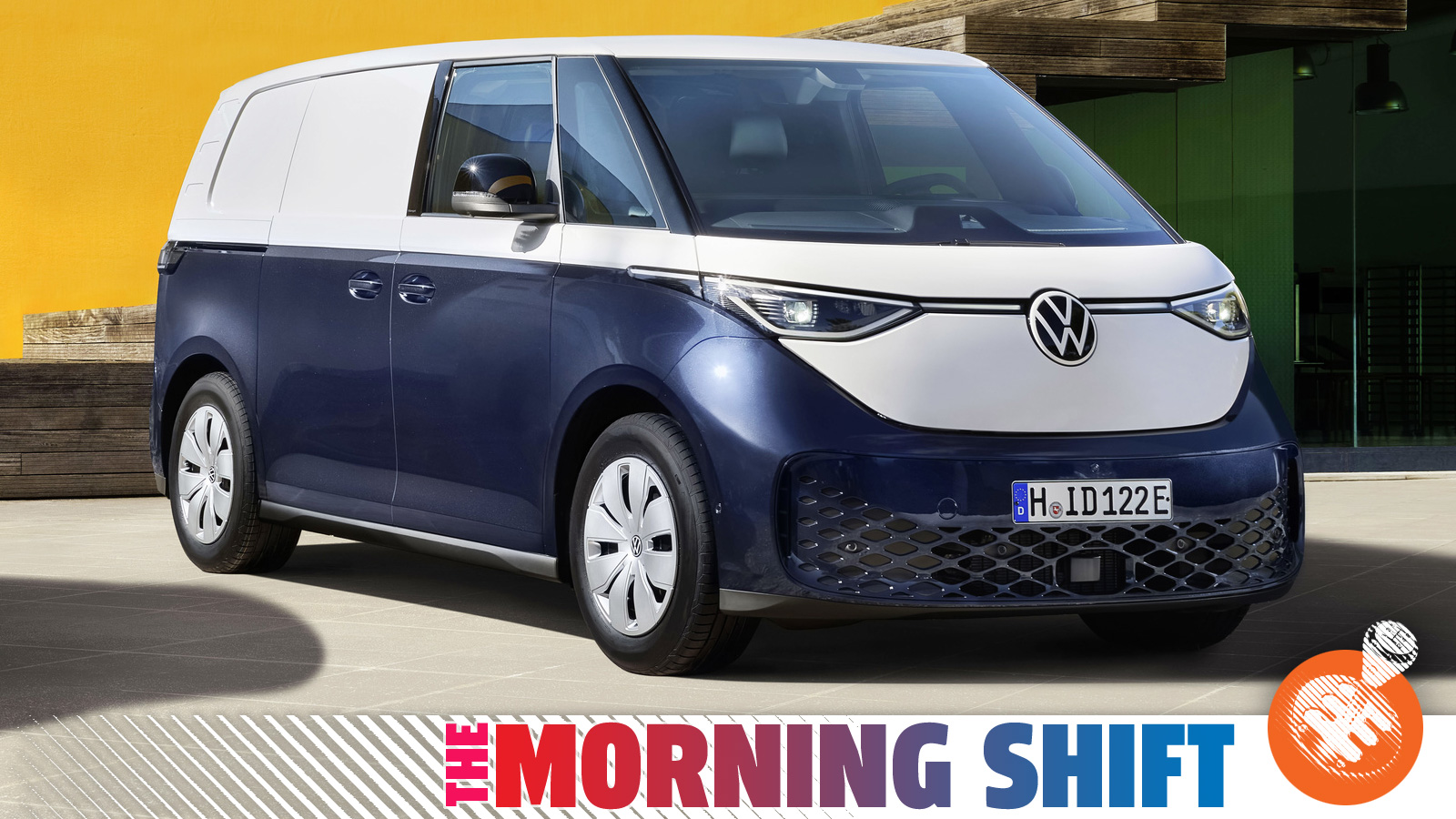The Modern VW Bus Will Cost Nearly $60,000 In Germany
The all-electric Volkswagen ID Buzz starts at roughly $57,000 for the cargo version, rising to nearly $68,000 for the passenger model.
Volkswagen's most fun vehicle doesn't have a very fun price, Mercedes-Benz is on a hunt to maximize profit margins and another fatal Tesla Autopilot crash is under government investigation. All that and more in The Morning Shift for Thursday, May 19, 2022.
1st Gear: Cute Will Cost You
The Volkswagen ID Buzz looks too charming to be expensive, but expensive is what it will be. The automaker's commercial vehicles division announced pricing for the battery-electric van in Germany, and even the cargo one is pricey. From Automotive News:
Volkswagen Commercial Vehicles has announced that prices for the ID Buzz electric van will start at 54,430 euros ($57,220) in Germany for the Cargo version and 64,581 euros ($67,891) for the five-seat passenger Pro version.
Orders will open on Friday for the Buzz, with retro styling that evokes the original air-cooled, rear-engine VW Kombi (or Microbus).The first vehicles will be delivered in autumn, VW said Wednesday in a news release.
U.S. deliveries are set to start in early 2024.The automaker says that with an environmental rebate, the base price for the Cargo is 46,455 euros and the Pro is 56,606 euros in Germany.
Other European countries, including France, offer similar incentives for EVs.
The cargo version has panel sides, two or three front seats, and fewer standard features than the Pro variant.
Among the options for the Pro are wheel sizes up to 21 inches, and various packs that add features for infotainment, comfort, driver assistance and entry/exit (lighted door handles, electric tail gate and doors). Eleven colors are available.
Similar packs are available on the cargo version, but more focused on utility.
Of course MSRP in one territory doesn't reflect MSRP in all of them, and Volkswagen is assuredly pricing the ID Buzz with government EV incentives in mind. Still, that's a chunk of change for a van that draws its inspiration from vehicles associated with accessible adventuring.
It's also not terribly far off rumors from earlier in the year that the ID Buzz would land in the $60,000 ballpark. The ID Buzz won't go on sale here until 2024. Our version will be larger than the one sold elsewhere, so it'll be interesting to see if Volkswagen can manage to come down in cost in the country that made the Type 2 iconic.
2nd Gear: Mercedes is “Trimming the Tree at the Bottom”
That's what Mercedes-Benz chief executive Ola Källenius said the company has to do to spur profit margins. Those comments, coupled with reports from those close to the company, suggest the A- and B-Class days are numbered — globally. From the Financial Times:
The group would reduce the number of so-called compact cars it offered from seven to four, he added, and "redefine the entry point of the Mercedes-Benz brand".
While Källenius refused to name the models that would be phased out, people close to the company have suggested that Mercedes will eventually axe its A and B-class ranges. The cheapest versions retail at €30,000.
Mercedes will focus instead on the performance-focused AMG brand, the off-road G-Class, and luxury marque Maybach, all of which will offer electric models in the next few years, as well as the electric EQ range and the recently relaunched S-Class saloon.
More than 75 per cent of the group's investments would be targeted at developing these models, as well as the E and C-Class ranges, Källenius said.
Such a move would mark a reversal for Mercedes, which pioneered the Smart car — one of the smallest vehicles on the market — before separating the brand into a joint venture with China's Geely in 2019.
The A-Class was already due to leave the U.S. after the current model year, which is hardly surprising given the American penchant for crossovers. But the larger picture here is that Mercedes is axing compact sedans and hatchbacks at a time when those are becoming increasingly difficult to produce at a low cost and in a way that meets both ever-stringent European emissions laws and maintains profitability. The GLA and GLB crossovers aren't mentioned in the Financial Times' story, so it's unclear if they'll be edged out in this focus upmarket, too.
It should be said that Mercedes hasn't exactly been struggling to maximize profits on its products lately:
[The news] also comes as the car industry continues to post record profits, despite severe supply constraints, with strong consumer demand helping carmakers fetch higher prices for the few models available.
This enabled Mercedes to achieve a 16.4 per cent profit margin on car sales in the first quarter of the year, higher than the 13 to 15 per cent targeted by Källenius for the middle of the decade.
But the Mercedes boss said a margin of above 16 per cent was not sustainable because of the "higher variable costs" in the "transformation" to electric. He has pledged to sell only electric cars by 2030, "where market conditions allow".
I have vague memories of reading Automobile magazine and the like in my youth when the German luxury set started flirting with cheaper, smaller cars. It seemed radical at the time. That optimism to broaden the reach of these luxury brands to welcome younger, less-affluent customers seems so foreign now.
3rd Gear: NHTSA Probes California Tesla Crash
The National Highway Traffic Safety Administration has investigated 34 accidents involving Tesla vehicles since 2016 to determine whether the company's "Autopilot" driver-assistance technology played a role, and now the agency is looking into another — a crash that occurred last week in Newport Beach, killing three. From Reuters:
The crash, involving a 2022 model Tesla Model S that slammed into construction equipment in Newport Beach last week, is one of 35 under investigation by the U.S. National Highway Traffic Safety Administration (NHTSA) involving Tesla vehicles in which advanced driver assistance systems like Autopilot were suspected of being used since 2016.
A total of 14 crash deaths have been reported in those Tesla investigations, including the three recent fatalities.
NHTSA confirmed the new probe of a May 12 Tesla Model S crash that killed three in the vehicle and injured three workers, when it struck construction equipment along the Pacific Coast Highway in Newport Beach.
Newport Beach Police declined to say Wednesday if the Tesla vehicle was in Autopilot mode at the time of the crash, saying it remains under investigation.
Last week, a Tesla Model 3 also crashed into the Greater Columbus Convention Center in Ohio. Amazingly, no one was seriously injured. In that incident the driver was cited for failure to control; likewise for the recent California crash authorities still haven't determined whether the Tesla in question was running with Autopilot active, or the more extensive FSD Beta.
4th Gear: Expedition and Navigator Recalled
Almost 40,000 2021 Ford Expedition and Lincoln Navigator vehicles are under a recall for a risk of engine fire, the manufacturer announced Thursday. This follows reports of 16 fires, and pertains to vehicles even when parked. In other words, Ford advises you don't park those large SUVs in garages or near structures for the time being. From Reuters:
The recall, which covers some 2021 model year Ford Expedition and Lincoln Navigator vehicles, was prompted as an engine compartment fire could occur while the car is parked or being driven, even with the ignition off, the No. 2 U.S. automaker said.
There was one injury but no accidents related to the fires, it said, and 14 of the 16 affected vehicles were owned by rental car companies.
A remedy was still under development and Ford was working to establish the cause.
This year, Ford has issued 30 recalls in the United States covering 3.5 million vehicles, the most of any automaker.
Seeing as Ford hasn't found a solution yet, the only thing owners really can do is park their Expedition or Navigator very far away from things, and keep their eyes and ears open for further guidance.
5th Gear: Rallying Wants Eyeballs
The World Rally Championship is the coolest form of motorsport not enough people know about, especially on our side of the Atlantic. After witnessing Formula 1's stratospheric growth stemming from a renewed investment in marketing, the WRC wants to share its story across the world, too. Not with yet another Drive To Survive clone, though — thank heavens. Rather, one of the ways in which it'll try to reach more people will involve a dedicated channel, per Motorsport.com:
The plans were announced at the WRC's 50th anniversary season gala dinner on the eve of Rally Portugal, where a host of champions from the WRC's past and present congregated to celebrate the milestone.
WRC Promoter boss Jona Seibel teased the concept while explaining the WRC's goals for the future during the dinner.
The exact details of how the channel will operate remain unclear at this stage, however further information is expected to be revealed in the coming weeks.
This latest development arrives at a time when the championship is focusing on growing its profile in new markets.
"In 2023 we will launch a 24/7 rally TV channel with all of the championships, the next milestone," said Siebel.
"We want to reach new markets, we want to enter new markets and implement in new countries so this is our plan to develop the TV so we are very very confident.
"We have an ambitious agenda, so let's do it."
I have my doubts. Launching a television channel in the age of on-demand streaming seems very odd, though Motorsport.com's article doesn't go into specifics about what platforms this initiative will take. In any case, the WRC needs to do something to expand, especially as it dips its toes into new markets. In this modern age of people romanticizing wilderness travel and the overlanding craze, there's a lot of potential to capitalize on here — if the sport goes about it the right way.
Reverse: Willy T. Ribbs
On this day 31 years ago, Willy T. Ribbs became the first Black driver to qualify for the Indianapolis 500. Motorsport Magazine commemorated the 30th anniversary of Ribbs' achievement by interviewing the driver last year, and the ups and downs to on his way to making the grid. In his own words:
"There was media everywhere, asking me these questions: 'Do you feel like you're responsible for 50 million African-Americans? Do you think you have to succeed because 50 million African Americans are watching and praying? And, if you don't, maybe there won't be another African American racing for a hundred years?' All these kind of questions!"
At least for the majority of the time, Ribbs managed to shut out the noise. Though he may now appreciate the meaning of what he achieved for black people around the world, at the time he was focused simply on qualifying.
"My number one responsibility was to myself, my team, sponsors and my family. Not for anyone else," he asserts.
"Ultimately, everything is so focused there (at Indy) that you know, you don't have to think about achievement, sports history, social advancement.
"I was there to be in Victory Circle if I could, and that's all that matters. If it's for anything else, you're not there for the right reason."
Neutral: New Additions to the Garage
Attention: Target now carries Majorette — at least in my local store — and Majorette makes WRC diecasts. Also, Hot Wheels is doing a '94 C-Class DTM with all the proper sponsors. I say it every time, but these are childhood dreams come true.

